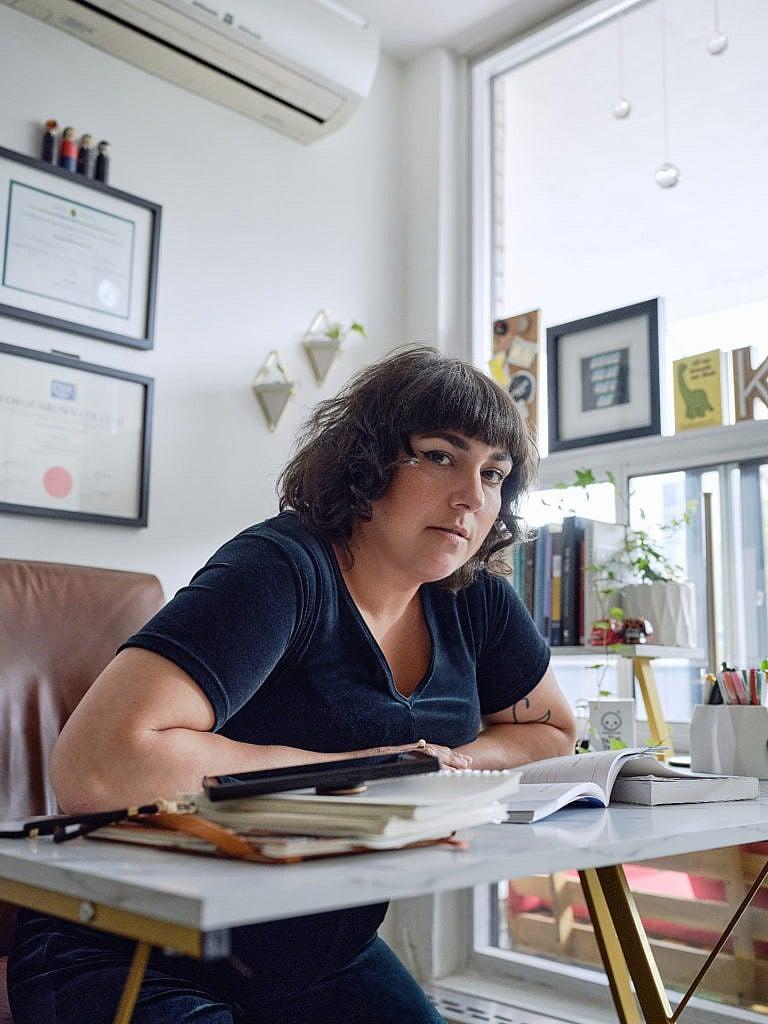The Gig: What it’s like being a death doula
“Simply saying, ‘Death sucks!’ validates clients’ feelings”

(Photograph by Claudine Baltazar)
Share
Kayla Moryoussef is a death doula in Toronto.
Early days: I grew up in Toronto the daughter of immigrants – my dad’s Moroccan and my mom’s South African. They worked a lot, my grandmother, Judith, was heavily involved in raising me. We were very close. When I was 15, she got cancer. I was pretty insistent about being there for her entire dying journey. I kept her company at the hospital almost every day. I took classical singing lessons as a kid, so she’d sometimes ask me to sing for her, too. I was at her bedside until her last breath. In many ways, my work as a death doula began there. As sad and traumatic as her death was, there was something profound and beautiful about it. I realized that death connects each and every one of us. It’s a journey we all experience.
Education: When I was 26, I enrolled in the two-year community-worker program at George Brown College. I started volunteering at a local hospice around the same time. One of my responsibilities was providing companionship for terminally ill people. Sometimes I’d sleep over at their homes to give their relatives a break from full-time care. Mostly, I offered a listening ear as patients shared their fears about dying.
How I got started: I was certified as a registered social service worker in 2019. After that, I joined another hospice that offered specific training to become a death doula—a term I’d never heard before. A doula usually works with someone who’s giving birth, but a death doula serves people who are leaving the world. I learned how to compassionately explain different aspects of the dying process to clients and their families, and help them navigate “legacy work,” like wills. I founded my own practice soon after.
Average day: I take on 15 to 20 clients a year, many of whom are older and have been diagnosed with terminal cancer. I meet with them virtually or visit them in palliative care units or at their homes, where I counsel them on how to build coping skills. Clients are often upset about having spent too much of their lives working, but I try to help them focus on the things they value the most—usually that’s family—and help them to prioritize those things in the time they have left. For their last days, I prepare a kit that includes scented candles or playlists of music they want to hear, and ask who they’d like in the room with them when they die. I also help them write goodbye letters. It’s really intense to read someone’s final words. I used to cry a lot after I got home from work, but I’ve learned to not take on someone else’s grief. That took some practice.
On-the-job uniform: I always wear casual, comfy and brightly coloured clothing to avoid looking like the Grim Reaper. I’m usually sporting a blouse and a comfy pair of slacks; I don’t want to look too formal or clinical.
Biggest challenge: It’s tough to make a living as a death doula. Right now, the profession is unregulated. We’re not typically employed by hospitals because many in the health-care sector see us as stepping on the toes of doctors and nurses. End-of-life care is a very different skill set—and the demand is there. Canada’s rapidly growing senior population will undoubtedly benefit from our services.
Biggest misconception: People ask me all the time if I euthanize my clients! Death doulas can support their decision to receive a medically assisted death. We’re not there to expedite the process.
Comforting words: Simply saying “Death sucks!” validates clients’ feelings. It’s going to happen, so we should figure out how to make it as pleasant as possible.
Last requests: A lot of my clients regret not spending more time outdoors and with loved ones. In their last days, It’s usually too difficult to take them to a park or on a field trip to a cherished place, but they’ll often ask to speak with family members—some of whom might be estranged from them—to tie up any loose ends.
Work perk: It may seem counterintuitive, but this job is very life-affirming. My clients have taught me to invest my time in the people and work that I love. I’m only 36, but this job has put my own life—and end-of-life priorities—into perspective. I could die tomorrow without any regrets.
—As told to Ali Amad